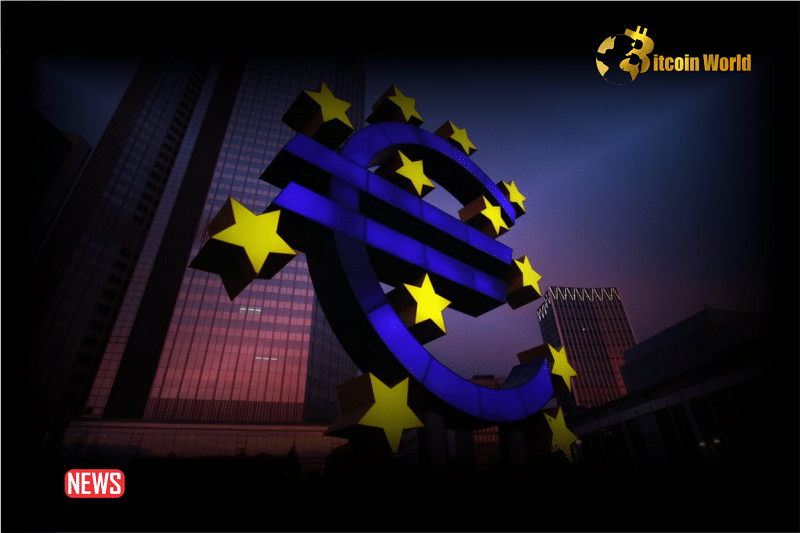In an era where digital transactions are becoming increasingly prevalent, the spotlight on data privacy has never been sharper. The European Central Bank (ECB) is taking center stage, reassuring citizens with a firm commitment to enhanced privacy measures for the upcoming digital euro. Worried about Big Brother watching your every digital penny? The ECB is aiming to ease those concerns with a privacy-focused approach to its central bank digital currency (CBDC). Let’s dive into what this means for you and the future of digital payments in Europe.
Digital Euro Privacy: What Improved Measures are Coming?
The ECB is not just paying lip service to privacy; they’re actively working to bake it into the very core of the digital euro. Here’s a breakdown of the key improvements they’re proposing:
- Robust Data Protection Guarantee: The ECB has pledged to uphold strong data protection and privacy standards, making it a cornerstone of the digital euro project.
- Single Access Point for Holding Limits: A new regulation is on the horizon to create a unified system for verifying users’ digital euro holdings, streamlining the process while aiming to maintain privacy.
- Collaboration with Data Protection Authorities: Working hand-in-hand with the European Data Protection Board (EDPB) and the European Data Protection Supervisor (EDPS), the ECB is incorporating expert recommendations to ensure top-tier personal data protection.
- Essential Data Processing Only: The focus is on minimizing data collection, processing only what’s absolutely necessary for the digital euro to function.
- Decentralization to Avoid Data Hoarding: The ECB is committed to avoiding excessive centralization of user data, distributing control to enhance security and privacy.
- Privacy Threshold for Online Transactions: To combat money laundering without unnecessary surveillance, a ‘privacy threshold’ is being considered for online transactions, limiting traceability for smaller amounts.
What Exactly IS the Digital Euro?
For those still getting acquainted, the digital euro is essentially a digital form of euro cash, issued by the central bank. Think of it as an electronic wallet directly from the ECB, designed for everyday payments. Here’s the lowdown:
- Electronic Payments for Everyone: The digital euro is designed to facilitate easy electronic payments for individuals, whether you’re shopping online or making in-person purchases.
- Privacy and Data Protection First: Unlike some cryptocurrencies or private digital payment systems, privacy and data protection are prioritized from the outset.
- Significant Investment: The ECB is putting serious money behind this project, earmarking over $700 million to advance the development, including the crucial offline functionality.
- Free for Users: The vision is a European payment method that’s free for users across the eurozone, making digital transactions accessible to all.
Crucially, the Eurosystem, which will manage the digital euro infrastructure, won’t be able to peek into the identities behind your transactions. Only authorized payment service providers will have access to that layer of information, adding an extra buffer for user privacy.
This commitment to privacy is a breath of fresh air for CBDC advocates, especially given the growing unease around digital surveillance. Imagine offline digital euro transactions mirroring the anonymity of cash – your transaction details remain solely between you and the recipient. Online, the ECB will handle minimal, pseudonymized data, strictly for essential functions like settling payments. You, the user, are meant to be in control of your data.
Financial stability is also a key consideration. The digital euro is designed to be interest-free and will have limits on public holdings. This is a deliberate move by the ECB to ensure it complements traditional banking, not disrupts it.
And for seamless usability? Expect innovative solutions to link your digital euro wallets with your existing bank accounts, making transactions smooth without the hassle of pre-funding your digital wallet.
Are There Concerns About CBDCs?
Of course, not everyone is on board with the CBDC hype. Critics are raising valid questions about potential downsides. What are the main points of contention?
- Government Overreach? Concerns exist about increased government control over finances and the potential for surveillance.
- Erosion of Privacy: Despite ECB assurances, some remain skeptical about the true extent of privacy protection in a digital currency system.
MEP Cristian Terheș, for example, has voiced worries about the potential for excessive government control and the erosion of privacy. These criticisms highlight the delicate balancing act the ECB faces: embracing digital innovation while safeguarding individual liberties.
CBDCs: How Does the US See It?
The digital euro is part of a global trend. CBDCs are gaining traction worldwide, with many countries exploring or already launching their own versions. By March 2023, 11 countries had live CBDCs, and over 20 central banks were running pilot programs. But the US approach is notably different.
In the United States, CBDCs are not as warmly received. Why the hesitation?
- Privacy Fears: The primary concern revolves around the idea that CBDCs could grant central banks and governments real-time transaction monitoring capabilities.
- Individual Liberty vs. Transparency: This sparks debate about the balance between individual financial privacy and governmental transparency.
See Also: Not Possible For Nation-States To Destroy Bitcoin and Ethereum Networks: Coin Metrics Research
Vivek Ramaswamy, a former US presidential candidate, has been a vocal critic, expressing concerns about CBDCs in interviews. He advocates for reducing the power of federal agencies, reflecting a broader sentiment of skepticism towards centralized digital currencies in some US political circles.
Disclaimer: The information provided is not trading advice. Bitcoinworld.co.in holds no liability for any investments made based on the information provided on this page. We strongly recommend independent research and/or consultation with a qualified professional before making any investment decisions.
#Binance #WRITE2EARN
Disclaimer: The information provided is not trading advice, Bitcoinworld.co.in holds no liability for any investments made based on the information provided on this page. We strongly recommend independent research and/or consultation with a qualified professional before making any investment decisions.



